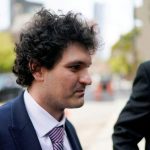
NEW YORK (Reuters) -Sam Bankman-Fried’s lawyer urged a judge on Tuesday to impose a lenient sentence for the FTX founder’s conviction for stealing $8 billion from customers of the now-bankrupt cryptocurrency exchange, arguing clients would get most of their funds back.
In a sentencing submission, Bankman-Fried’s lawyer Marc Mukasey told U.S. District Judge Lewis Kaplan that a guidelines range between 5-1/4 and 6-1/2 years would be an appropriate prison term.
That is far less than the maximum sentence of 110 years he faces after a jury found him guilty in November on seven counts of fraud and conspiracy, in what prosecutors have called one of the biggest financial frauds in American history.
Bankman-Fried pleaded not guilty and is expected to appeal his conviction and sentence. He acknowledged making mistakes running FTX, but testified at trial that he never intended to steal customer funds.
Kaplan is set to sentence the former billionaire, who turns 32 next week, on March 28.
The lawyer’s submission was accompanied by letters of support from Bankman-Fried’s parents, psychiatrist, and others.
His parents, the Stanford law professors Joseph Bankman and Barbara Fried, said their son was uninterested in material wealth and worked hard to make customers whole in the month between Bahamas-based FTX’s November 2022 collapse and his arrest on fraud charges a month later.
“Barbara and I…witnessed firsthand his single-minded focus on getting money back to depositors, long after there was any possibility he would be able to save any of his equity or wealth,” Bankman wrote.
Mukasey called a 100-year guidelines range calculated by probation officers “barbaric”, saying it was based partly on a faulty assertion that FTX’s customers lost billions.
He pointed to the bankrupt company’s recent assertion that it expected to repay all customers in full to back up the argument that Bankman-Fried did not set out to steal.
“The conviction does not address whether Sam intended to pay the money back. He did,” Mukasey wrote.
The probation officers’ calculation is not binding on Kaplan. The U.S. Attorney’s office in Manhattan is expected to make its own sentencing recommendation by March 15.
ELIZABETH HOLMES OR MICHAEL MILKEN?
A graduate of the Massachusetts Institute of Technology, Bankman-Fried rode a boom in the values of digital assets such as bitcoin to a net worth Forbes magazine once estimated at $26 billion. His fortune evaporated in November 2022, when FTX declared bankruptcy after a wave of customer withdrawals.
At his month-long trial in Manhattan federal court, three former close associates testified that Bankman-Fried directed them to help loot FTX customer funds to plug losses at his Alameda Research hedge fund, even while presenting himself publicly as a responsible steward in the volatile cryptocurrency market.
Prosecutors said Bankman-Fried also used customer funds to buy luxury real estate in the Bahamas and to donate to U.S. politicians who might support cryptocurrency-friendly regulations.
Bankman-Fried testified that he did not realize how much Alameda owed to FTX until shortly before both failed.
Mukasey acknowledged Bankman-Fried’s case bore some similarities to that of Elizabeth Holmes, another young entrepreneur who was sentenced to 11 years in prison in 2022 for defrauding investors in her now-defunct blood-testing startup Theranos.
But he said Holmes put patients at risk, and suggested Bankman-Fried had more in common with Michael Milken – a Wall Street financier in the 1980s known as the “junk bond king” who was released from prison after serving just two years of an initial 10-year sentence on fraud charges.
“Given the same chance, Sam would dedicate his post-prison life to charitable works,” Mukasey wrote.
MOTHER SAYS SHE WOULD CHANGE PLACES
Bankman-Fried has been jailed at Brooklyn’s Metropolitan Detention Center since August, when Kaplan revoked his bail after finding that he likely tampered with witnesses.
In a letter to Kaplan, Bankman-Fried’s psychiatrist George Lerner wrote that he is on the autism spectrum. Mukasey wrote that Bankman-Fried struggles to make eye contact and communicate with others, which could leave him vulnerable in a prison setting.
Bankman-Fried’s mother wrote that her son had taken responsibility for the errors that led to FTX’s collapse and was remorseful, but said she feared for his life in prison.
“His father and I face the very real possibility that we will not live long enough to see him freed,” Fried wrote. “I would gladly change places with him if I could.”
To read the full article, Click Here

